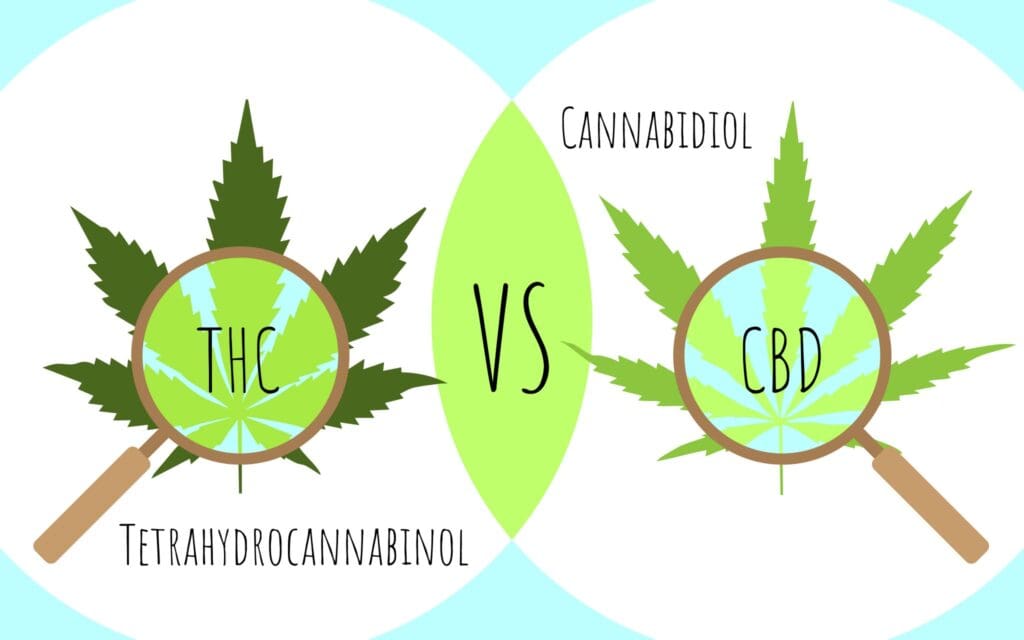The world of CBD and THC can be very confusing, we get it. From memes jokingly saying CBD is decaf weed, to all the lingo like CB2 receptors, sativa, indica, and cannabichromene—it’s easy to get lost in it all. Getting the wrong thing can mean going a longer time with the issues that you’re needing relief from. Here to clear the air a bit, is our quick guide to knowing the difference between CBD and THC.
First thing’s first, learning where it all starts:
Starting with the Cannabis plant! Both CBD (Cannabidiol) and THC (Tetrahydrocannabinol) are compounds that can be extracted from it. There is also a hemp plant (which is in the same collection of plants as cannabis) where you can extract the CBD compound. THC can’t be extracted from hemp plants because they only contain up to 0.3% THC. Both CBD and THC are cannabinoid compounds, so the effects are similar because they both work in the same system of your body: the Endocannabinoid System (ECS). This is the system that is responsible for regulating a plethora of your body’s functions like sleep, appetite, and memory.
How are CBD and THC similar?
Like we said earlier, they’re both cannabinoid compounds that come from the same plant. They affect the neurotransmitters in your brain, essentially talking to your cells about things like pain sensations, stress, immune system function—stuff like that. CBD and THC share many of the same benefits like:
- Help falling asleep
- Nausea or other appetite related issues
- Symptoms of stress and anxiety
- Chronic pain relief
The many ways you take CBD and THC are very similar, too. Smoking, oils, edibles, topical creams, and vape can all be used for CBD or THC.
Okay, so what’s the difference?
Their differences come when you look at how each compound works in our ECS specifically. In our ECS, there are Cannabinoid Receptors (CB receptors). Think of these like the adapter to the ECS. The better a compound can connect to the CB1 receptor, the more it can work with your ECS (if it doesn’t attach well—kinda like an iPhone charger that’s falling apart—the connection won’t be as strong and won’t function with the ECS as intensely).
Feeling high
THC attaches really well to the CB1 and CB2 receptors in your brain. This is where the sensation of feeling high comes from. You should also know that THC’s ability to bind to the CB2 receptor specifically is why weed as a medicinal function is important, as the CB2 receptor has to do with the body’s immune system. CBD doesn’t really attach to the CB1 or CB2 receptors. This is what keeps CBD from making you feel high. If you take both CBD and THC, the THC allows the CBD to attach to the CB1 receptor, but the properties in CBD keep the THC from making you feel high.
Drug testing
In general, CBD is legal in most states across the U.S. as long as it contains no more than 0.3% of THC. Weed is a bit trickier. Some states have legalized recreational and/or medicinal THC, while others have all forms of weed illegal still. Most drug tests are looking to detect THC, which can remain in your system anywhere from 36 hours to several weeks, depending on how often it’s used. It’s rare, but it is possible for CBD use to bring a positive drug test, because of the amount of THC it could have. If you’re needing to pass drug tests as a CBD user, opt for broad spectrum CBD, making sure theres no THC in it at all.
Key things to remember
CBD
- Chronic pain relief
- Help with anxiety, stress, & depression
- Not detectable on drug tests
- No “high” feeling
- Extracted from Cannabis and Hemp plants
- Doesn’t attach to CB1 or CB2 receptors
- Safe for pets
THC
- Chronic pain relief
- Help with anxiety, stress, & depression
- Detectable on drug tests
- Gets you “high”
- Extracted from Cannabis plants
- Binds to the CB1 & CB2 receptors
- Not safe for pets
| CBD | THC | |
| Relief from chronic pain symptoms | ✔️ | ✔️ |
| Helps with anxiety/stress/depression | ✔️ | ✔️ |
| Detectable on drug tests | ✔️ | |
| Intoxicating (Feeling High) | ✔️ | |
| Extracted from Cannabis plant | ✔️ | ✔️ |
| Attaches to CB1 & CB2 receptors | ✔️ | |
| Safe for pets | ✔️ |







